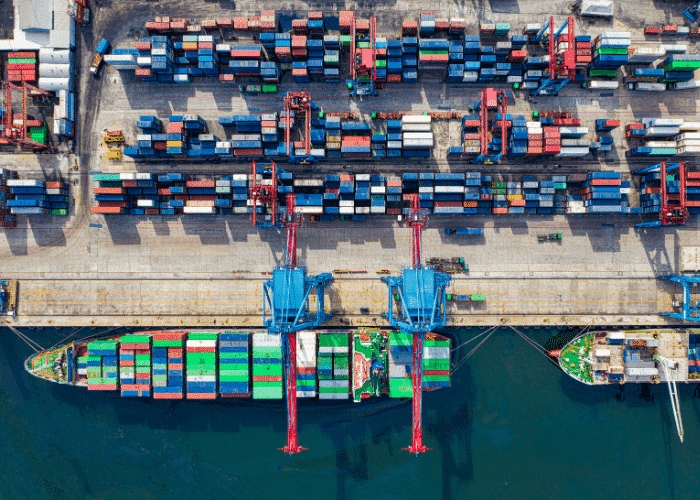A Career in Logistics – A Detailed Guide
We are happy when we get our favourite book delivered by Amazon on time. At the same time, delays in deliveries are not something we look forward to, be it a book or the new car that has missed delivery by over two weeks!
In the first case, we wonder at the amazing logistics that went into getting the book across on time. In the second, we blame the bad logistics for the delay of your book or your car.
What is Logistics?
In the military, where this term originated, it meant coordination and movement of troops and materials, their accommodation and storage.
Because of the complex and dynamic nature of such exercises, the term ‘logistics’ soon came to be used in the organization, transport, and storage of goods in trade.
Today the scope of logistics includes the functions of purchasing, transport, storage, sales, and distribution of goods, just to name a few. Logistics is an integrated network of supply chains that connect producers and end customers through different modes of transport.
When we consider the fact that about 800 million containers (TEU) worth about 18 trillion US Dollars are traded and moved in the global market annually, we can imagine the sheer size of the global logistics market and the career opportunities that it offers!

Why a Career in Logistics?
The logistics field is expected to grow exponentially in the coming years and is one of the industries with the fastest growth rate. Though this growth rate varies between the different markets and the entities reporting it, a 4 – 7% annual growth rate on a global scale would be a general conservative estimate.
Experienced and well-qualified hands are required to manage an organization’s supply chain. The work environment varies and it may involve moving from one location to another and knowledge of handling different equipment and software. The challenge in logistics lies in the meeting of deadlines effectively and efficiently.
A lot of diligence and planning is required to achieve these objectives and overcome the hurdles that crop up on the way. An effective communication network and the ability to work calmly even when under pressure are key to being a successful logistician.
Logistics is a field that comes under Supply Chain Management (SCM). Training and courses provided by leading organizations in supply chain management and logistics can help you get ahead of the competition by acquiring a holistic and clear understanding of supply chain management.
While several associate degrees are available in the supply chain, logistics, and transportation, a bachelor’s degree is considered more appropriate these days while going for a logistics job.
Some of the jobs in logistics are those of the shipping administrator, purchase administrator, sales-order processing administrator, logistics supervisor, logistics manager, supply chain manager, logistics operations manager, transport manager, purchase manager, etc. These are just a few of the main positions that we find in the logistics industry today.
Some Positions In Logistics
Let us take a quick look at the job descriptions of these logistics positions.
Purchase Administrator
A Purchase Administrator (PA) is responsible for placing approved purchase orders with the appropriate suppliers. The PA has to monitor and track all purchase orders and flag possible delays, and shortages to his supervisor. He has to make related stock adjustments, prepare the related customs documentation necessary for the import of the goods, etc.
He may also be tasked with calculating the landed cost and selling price of goods following the organization’s costing and pricing policies. Typically, a purchase administrator reports to the Purchase Supervisor or the Purchase Manager.

Sales-order Processing Administrator
A Sales-order Processing Administrator’s (SOPA) main duty involves the input of approved and authorized sales orders into the organization’s sales order system for picking and delivery to the customers by the warehouse staff. The SOPA issues authorized credit notes and processes other related sales transactions. The duties performed by a SOPA normally call for reporting to the logistics supervisor.
Shipping Administrator
Preparation and collation of all necessary customs clearance or export documentation come under the responsibility of a Shipping Administrator (SA). He may also be responsible for the calculation of customs duties and taxes on the goods.
Accuracy in documentation and calculations is necessary for the timely clearance of inbound shipments and export of outbound cargo.
The shipping administrator’s role is unique in that he may report directly to the logistics supervisor but at the same time, he may also have dotted-line reporting to the supply chain manager or the transport manager.
Logistics Supervisor
Planning and executing the daily warehouse activities, transportation, supervising the logistics staff, and liaising with customers are the general responsibilities of a Logistics Supervisor (LA). He will be in charge of receiving goods, storing them, overseeing the inventory. When sales orders are processed, he has to ensure that the goods are picked and that they are supplied to the customers.
Logistics Manager
The Logistics Manager (LM) will be responsible for the overall management of the logistics operations of an organization. This includes both inbound and outbound operations.
The LM plans, directs, and manages the physical inventory to fulfill order cycles effectively and efficiently. Besides ensuring the safety and security of the warehouse infrastructure and MHE (Material Handling Equipment), he has to maintain discipline among the staff and keep them motivated for optimum performance.
Supply Chain Manager
What is the role of a Supply Chain Manager (SCM)? In a nutshell, the SCM is in charge of procurement of the right goods, at the right price, made available at the right time. He works closely with his purchasing team, the sales department, warehouse, and suppliers to plan and forecast inventory for the organization.
The SCM has to ensure optimum inventory and availability, reducing shortages or out-of-stock situations while keeping the costs down.
Purchase Manager
The Purchase Manager’s (PM) main duty is to manage the purchasing activities of the organization. A PM maintains a good supplier database and builds up and maintains a good relationship with them. Contract and price negotiations are an important aspect of his role. He designs, plans, and implements strategies for sourcing and purchasing.
Transport Manager
An organization’s transport-related operations are managed by its Transport Manager (TM). Activities such as dispatching of cargo, routing of vehicles, preparing drivers roster, maintenance and repairs of vehicles to ensure their load and road-worthiness, etc. are important in transportation, besides tracking the vehicles and cargo. A TM has the responsibility of coordinating and managing all these activities to ensure their smooth flow.
What does it take to be successful in the above jobs? Good personal management, communication skills, and maintaining strong working relationships with all staff is very important here. Whether one is in a management role or working as a junior staff, these qualities go a long way in fulfilling their respective roles in the organization.
Managers have to build a positive work culture within the organization that centres on trust and respect for each other. They should focus on helping employees move up their careers through appropriate training and counselling.
Each employee will have their strengths and weaknesses. While being assertive, it is up to the manager to tap into these strengths and manage the weaknesses in a way that would benefit the organization.
The above positions and their general descriptions are only indicative. Each organization may have its designations that are tailored to suit the unique functions of the organization.

Specializations in Supply Chain Management and Logistics Courses
Some of the main specializations that one may come across when looking for a course in Supply Chain Management and Logistics are as follows:
- Principles of Supply Chain
- Inventory Management
- Transportation and Distribution Management
- Procurement and Principal Relationship Management
- International Business Management
- Supply Chain Management Information Systems
- Business Research and Analysis
- Supply Chain Risk Management
These courses set a strong foundation of skills and competencies that will prepare one for a broad range of careers in logistics or transportation.
Eligibility and the qualifying criteria required for joining the various courses may be different from one organization to another. While the very basic courses can be taken up by anyone with basic education, the others may need higher education as well as experience in the relevant field.
Let us take a look at some of the leading organizations that offer some of the best and recognized degrees in the field of supply chain management and logistics.
The Chartered Institute of Logistics and Transport, United Kingdom
One of the oldest professional organizations in the field of the supply chain, logistics, and transport, it is headquartered in Corby, United Kingdom.
The CILT, as it is popularly known, has its presence in 30 countries and offers courses and support to students and members. Besides helping to gain qualifications in the supply chain, logistics, and transport, it helps its members in identifying best practices, benchmarking, and various other requirements of the field.
To take up a course at the CILT you have to first become an associate member. Qualifying criteria include education as well as experience.
As a student member, you can complete the certificate level courses and move your way up to the MILT (Member of Institute of Logistics and Transport), CMILT (Chartered Member of Institute of Logistics and Transport), and FCILT (Fellow Chartered Institute of Logistics and Transport). The FCILT is the highest grade offered by the CILT.
University of Petroleum and Energy Studies, Dehradun, India
The University of Petroleum and Energy Studies (UPES) is located in the state of Uttarakhand in India. A fairly new entrant, it has quickly caught on as a premier institute that collaborates with experts in the supply chain, logistics, and transport and follows best practices of the industry. It has tie-ups with several industry leaders.
The UPES keeps up with the latest curriculum and offers international exposure to its students through faculty and student exchange programs, collaborative seminars, and collaborative research held in association with foreign universities. It also offers study programs for its students in Germany or Canada.
The UPES School of Business offers several Bachelor degrees ranging from logistics management to aviation management. Their post-graduate programs include MBA in logistics planning and supply chain, MBA in aviation management, MBA in port and ship management, etc.
The eligibility to join all Bachelor programs is a pass with a minimum of 50% marks in the higher and senior secondary school level examinations conducted by the Central Board of Secondary Education of India (CBSE).
The MBA programs have an eligibility requirement of a minimum of 50% marks in the higher and senior secondary school level examinations conducted by the Central Board of Secondary Education of India (CBSE). Besides, the candidate should be a graduate from a recognized university in any stream, having passed the final exam with a minimum of 50% marks.
The UPES School of Business also conducts a doctoral program that awards the student with a PhD in transportation management at the end of his doctoral tenure.
To join the PhD program, the candidate should have a Master or an equivalent degree with 55% aggregate marks. Those who have a good academic or professional track record in the logistics or transport field are usually preferred by the university.

Universities in the United States
Several reputed universities in the United States offer qualifications in logistics and transport. Some of them are listed here:
Portland State University – Graduate Certificate in Logistics and Transport
University of Memphis – Graduate Certificate in Freight Transportation
Massachusetts Institute of Technology – Master of Science in Transportation
New York University – Master of Science in Transportation
University of New Orleans – Master of Science in Transportation
Arizona State University – Master of Science in Global Logistics
To take up studies in the US requires good SAT or ACT and IELTS scores. One should have completed 16 years of formal education and should have obtained a valid student visa.
Motivation is key to success and moving forward in life. Motivated employees are always in demand and they are considered the next in line to become the leader. Besides, to be part of any successful logistics operations, it is necessary to keep abreast of the latest developments in the field even though one may have completed several courses and attended several different logistics training sessions.
Supply chain and logistics is an industry that guarantees to give you newer and more intense challenges every day! So, good luck and get going!
You might also like to read:
- How To Become A Shipbroker – Everything You Wanted To Know
- How to Become a Naval Architect?
- How to Become a Marine Engineer?
- How to Become A SIRE Vetting Inspector?
- 50 Marine Careers Essential Guide
Disclaimer: The authors’ views expressed in this article do not necessarily reflect the views of Marine Insight. Data and charts, if used, in the article have been sourced from available information and have not been authenticated by any statutory authority. The author and Marine Insight do not claim it to be accurate nor accept any responsibility for the same. The views constitute only the opinions and do not constitute any guidelines or recommendation on any course of action to be followed by the reader.
The article or images cannot be reproduced, copied, shared or used in any form without the permission of the author and Marine Insight.
Do you have info to share with us ? Suggest a correction

About Author
Hari Menon is a Freelance writer with close to 20 years of professional experience in Logistics, Warehousing, Supply chain, and Contracts administration. An avid fitness freak, and bibliophile, he loves travelling too.
Latest Marine career Articles You Would Like:
Subscribe To Our Newsletters
By subscribing, you agree to our Privacy Policy and may receive occasional deal communications; you can unsubscribe anytime.















